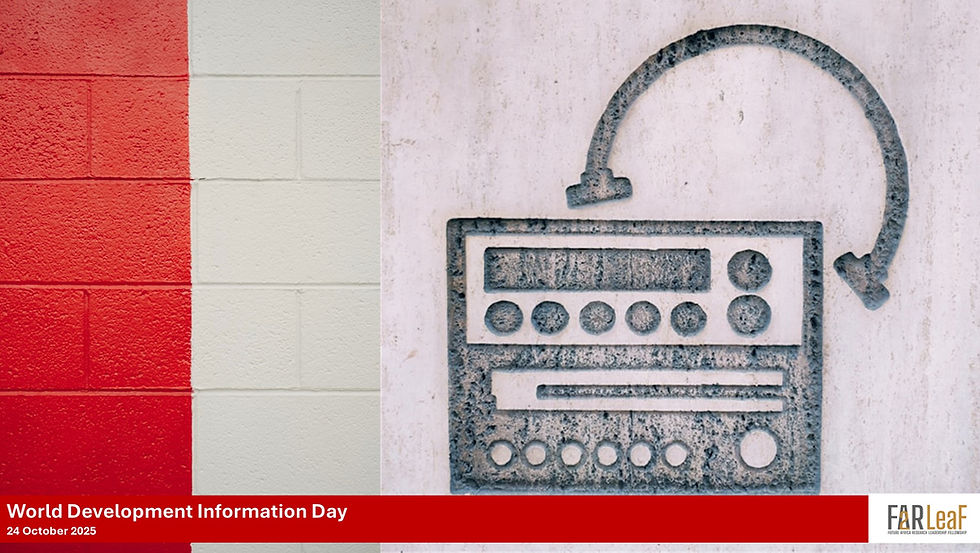Nurturing progress, community engagement and sustainability
- Leti Kleyn
- Jan 26, 2024
- 3 min read
Updated: May 28, 2024

Celebrating World Environmental Education Day in 2024 is a moment of reflection and a call to action for individuals and communities worldwide.
APSE's activities serve as a beacon of hope, demonstrating that collective efforts can profoundly impact our environment, no matter how small.
Dr Emmanuel Chukwuma is at the forefront of translating research to impact society; this led to the birth of the Alliance for Progressive and Sustainable Environment (APSE), an NGO committed to fostering positive change in environmental practices. The progress made by the NGO in impacting local communities is hinged on the fact that global accomplishment starts with local actions. Some of the NGO's activities to date include the following:
Tree Planting for a Greener Tomorrow
APSE has actively engaged in a tree-planting exercise that echoes the importance of reforestation in combating climate change. In Sept 2023, on two separate activities, APSE, through her volunteers, planted trees in a public space and at Nnamdi Azikiwe University, Awka. The organisation recognises trees' indispensable role in sequestering carbon, purifying the air, and fostering biodiversity. APSE has planted many trees through strategic partnerships and community involvement, creating healthier, more sustainable ecosystems.
Tackling Plastic Pollution
Acknowledging the grave threat posed by plastic pollution, especially in developing countries, APSE has conducted numerous clean-up exercises. Volunteers from diverse backgrounds joined hands to scour the streets, parks, and public spaces, collecting plastic waste in bags. This hands-on approach addressed immediate environmental concerns and was a powerful awareness-building exercise. APSE believes every plastic picked up is a step towards a cleaner environment and a collective commitment to responsible waste management. Through the support of FAR-Leaf, a plastic crushing machine with the capacity to destroy about 500kg of plastics has been installed and will start the entire operation soon.
Access to Clean Water through Sales of Household Water Filters
In his quest for sustainable solutions, the FAR-leaf fellow under the umbrella of APSE launched the sale of water filters, recognising the critical importance of clean water access. The product provides communities with a reliable source of clean drinking water and contributes to reducing single-use plastic bottles and sachet water. The initiative aligns with APSE's vision of creating a future where access to clean water is a universal right and communities are empowered to take charge of their environmental footprint. A recent analysis indicates that about 655,2200 single-use plastics have been avoided through the project.
Harnessing Solar Power for a Brighter Future
Embracing renewable energy, APSE has implemented a solar energy system in its secretariat to power its operations and projects. This step toward clean, sustainable energy reflects the organisation's commitment to reducing its carbon footprint and championing eco-friendly alternatives. By harnessing the sun's power, APSE ensures a reliable energy source and sets an example for others to follow in the transition to renewable energy. There is still a great deal of work to be done to encourage individuals, businesses, and companies in the region to transition from using fossil fuels to a clean energy source. The organisation is considering partnerships with suppliers of solar products to boost community adoption of clean energy sources.
Sensitisation and Awareness Campaign: Empowering Communities
Recognising that lasting change begins with awareness, APSE has undertaken extensive sensitisation campaigns. Through workshops, seminars, and community engagement initiatives, the organisation has educated individuals on sustainable practices, waste reduction, and the importance of environmental conservation. By empowering communities with knowledge, APSE aims to create a ripple effect, inspiring widespread commitment to a more sustainable way of living.
A Collective Commitment to a Sustainable Future
As we celebrate World Environmental Education Day, we must acknowledge the impact of international organisations, funders, and platforms like FAR-LeaF in empowering young, passionate researchers to become change-makers. The progress made by research leaders is possible through strategic planning and should be encouraged. We must also strategise on best practices to impact our communities, especially with the increased adoption of technology.
APSE's activities serve as a beacon of hope, demonstrating that collective efforts can profoundly impact our environment, no matter how small. As we commemorate World Environmental Education Day, let us reflect on our roles in shaping a greener, more sustainable world and pledge to work together towards a future that respects and preserves the beauty of our planet.
Heidi Sonnekus, in conversation with Emmanuel Chukwuma









